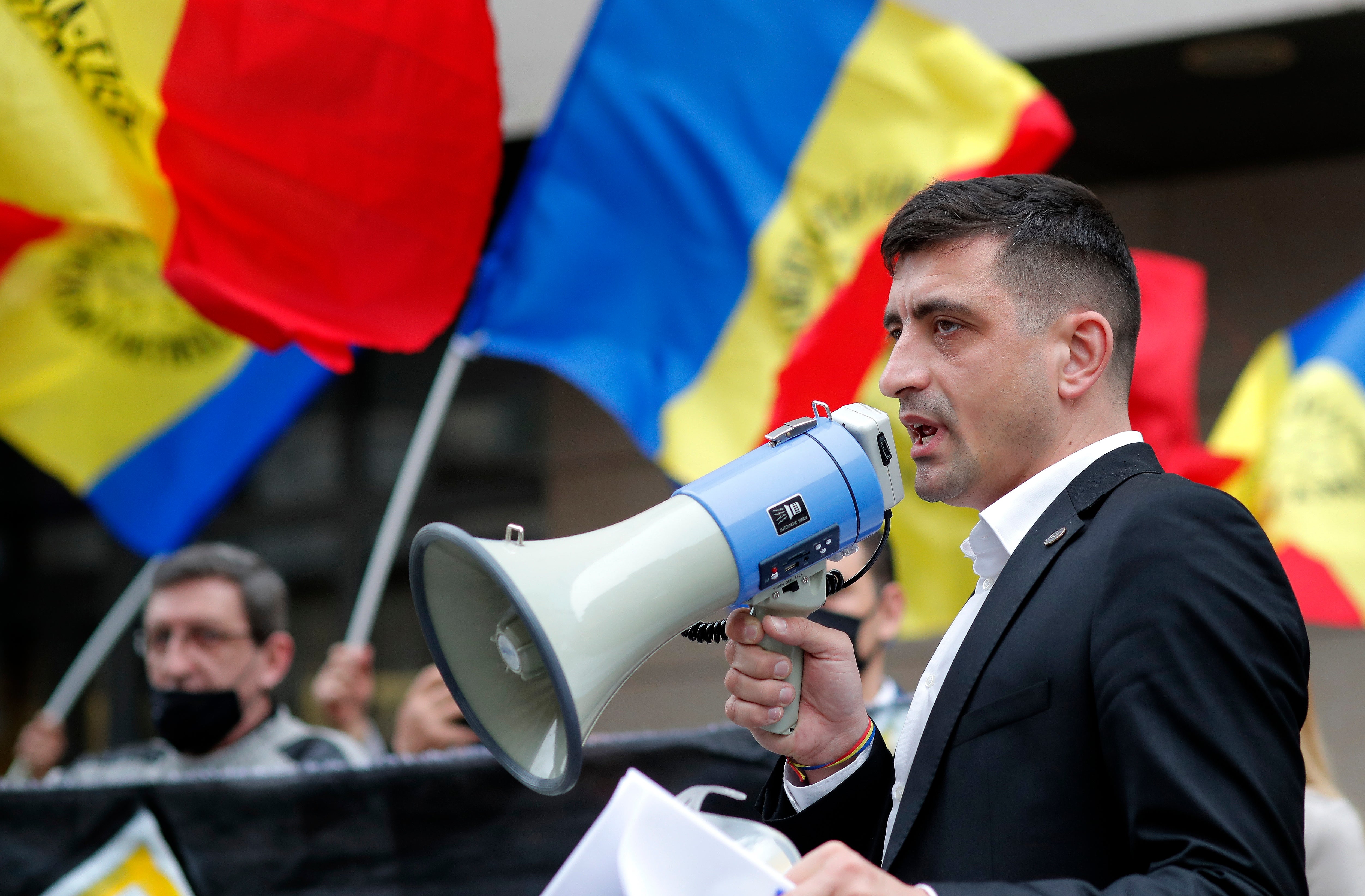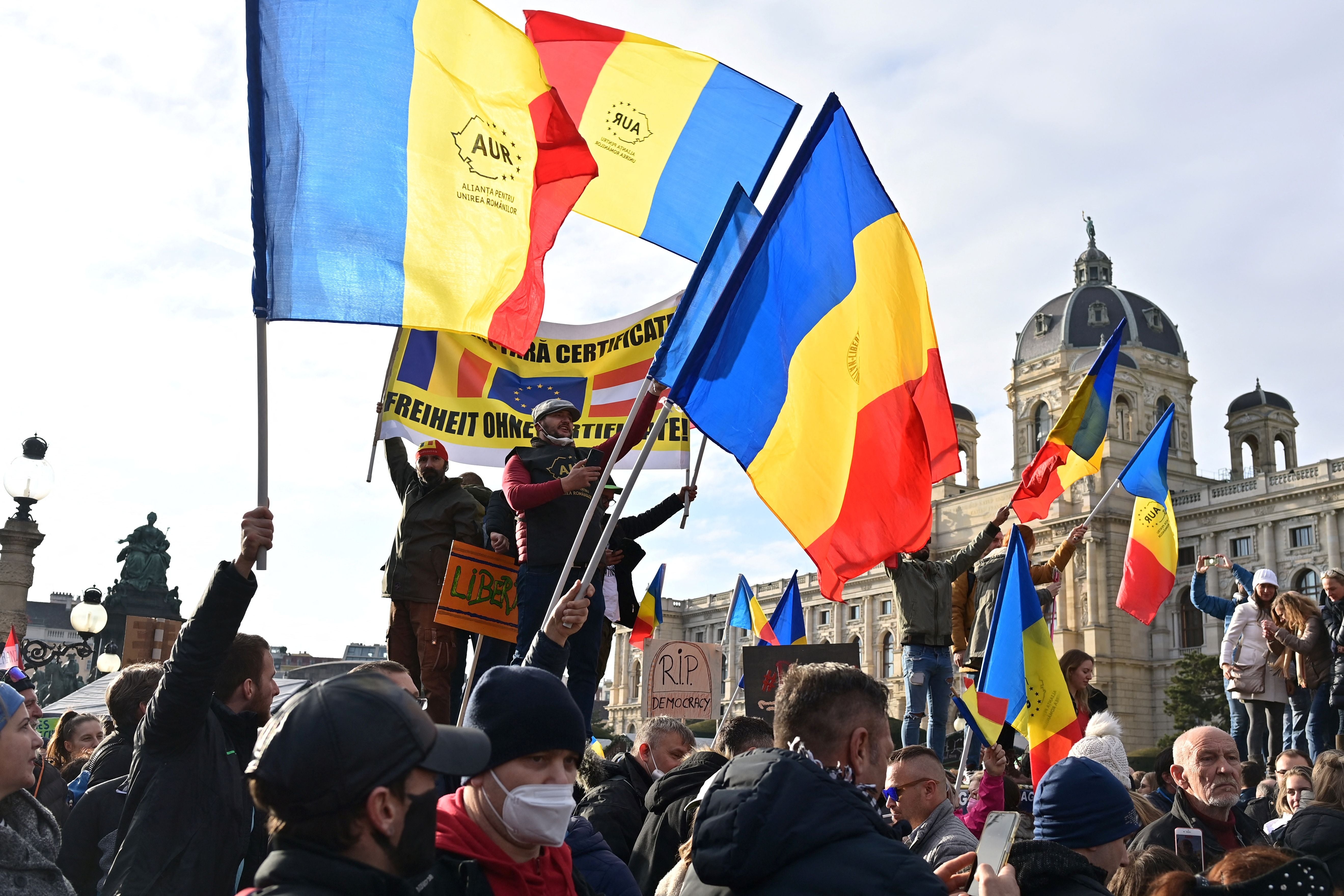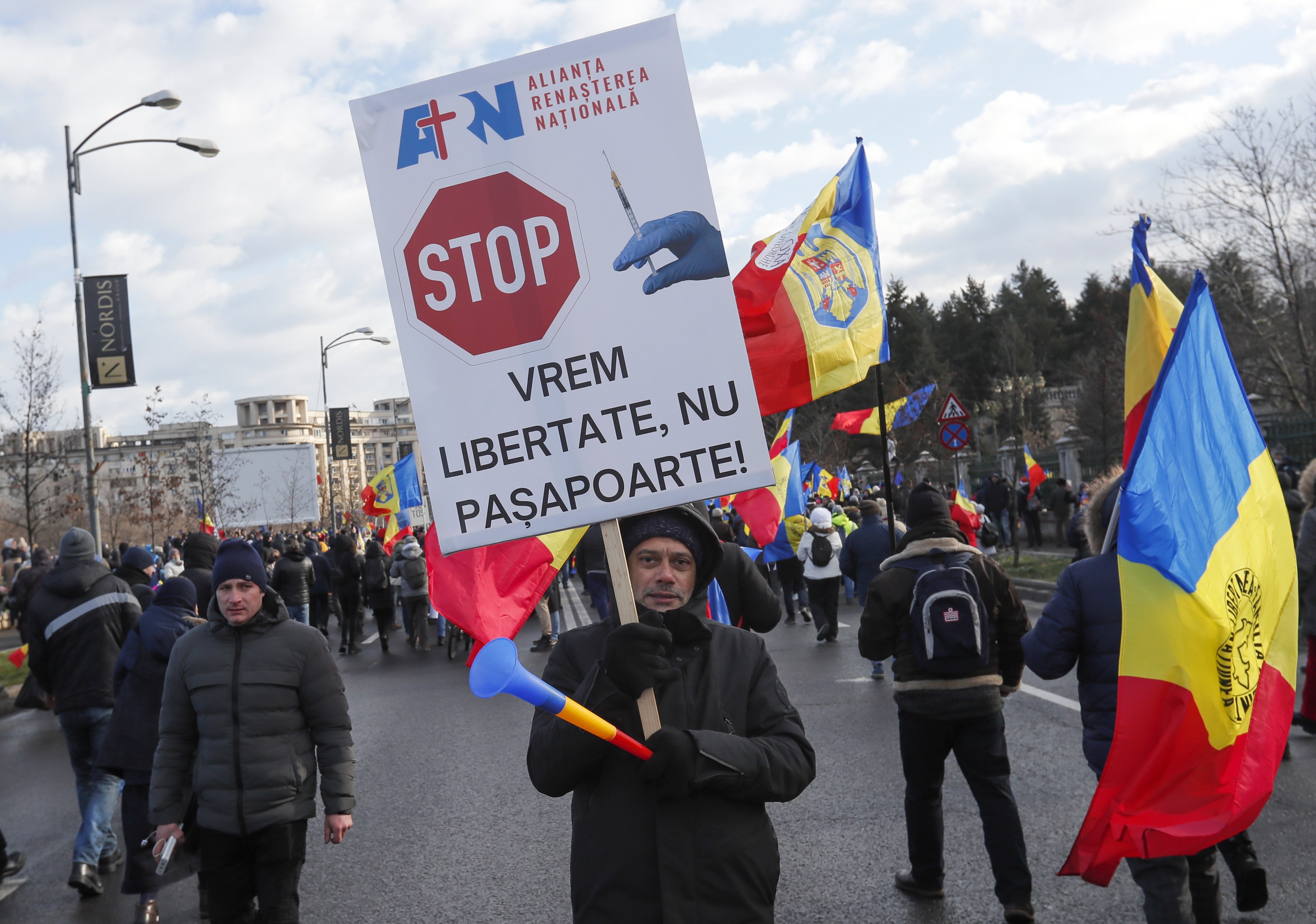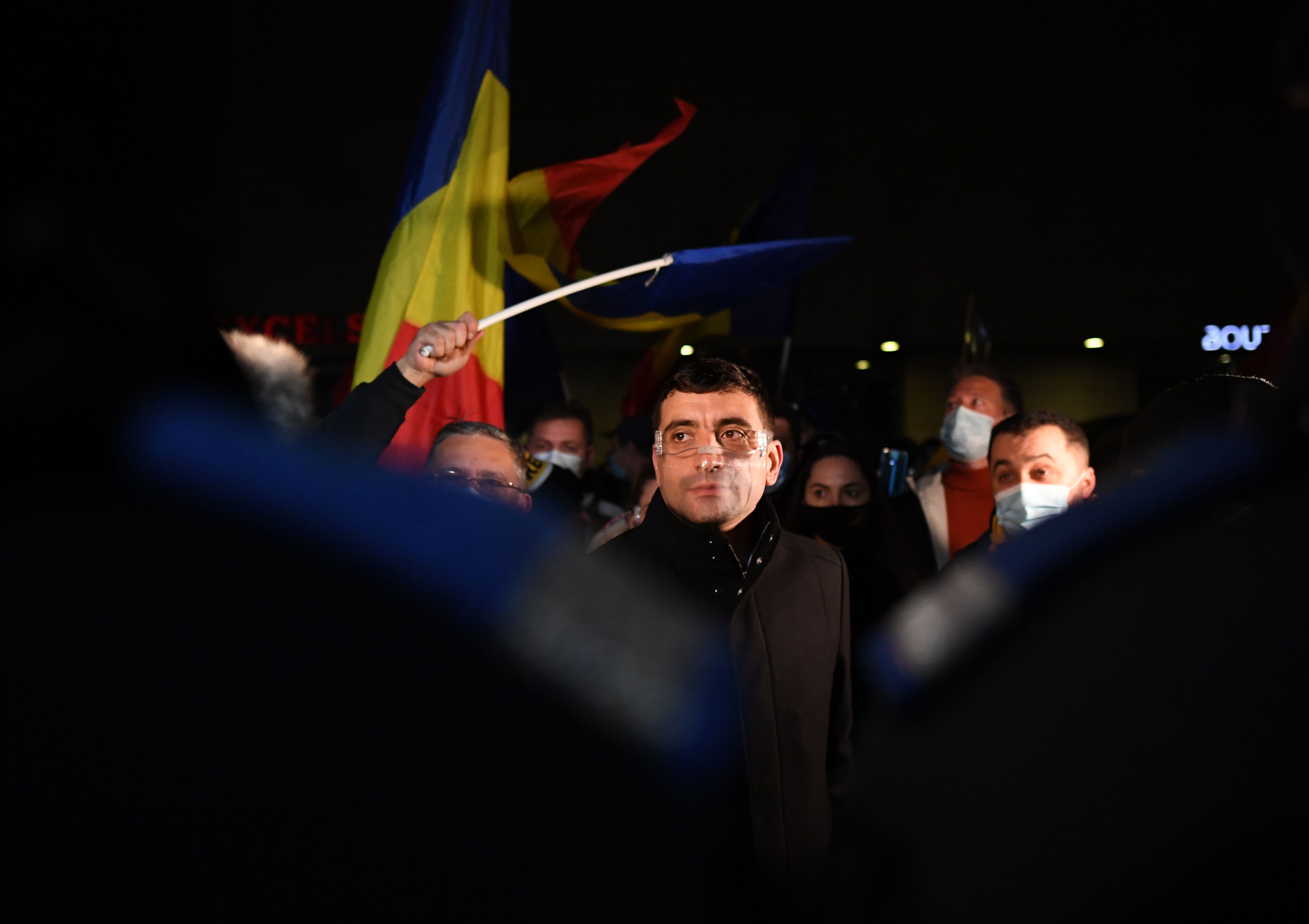‘People are very angry’: With populist support and a violent edge, a right-wing party surges in Romania
The leader of the Alliance for the Union of Romanians says he has a mandate to confront the political elite but the party stands accused of bullying, xenophobia and extremism, reports Borzou Daragahi in Bucharest


A former football hooligan turned politician and his relatively new political party – the Alliance for the Union of Romanians (AUR) – are shaking up the eastern European nation like rarely before.
In December, George Simion’s riotous supporters swarmed Romania’s parliament to halt the passage of a mandatory Covid health pass – and unlike 6 January insurrectionists who attacked the United States Congress in a failed attempt to halt the certification of president Joe Biden’s victory – the Romanians succeeded. The measure failed.
In January, Simion, leader and co-founder of AUR, led the charge as a mob swarmed the office of the mayor of Timisoara, a major Romanian city, merely because he is a foreigner.
And last week, during a contentious debate in parliament, Simion approached the country’s energy minister on the floor of parliament and grabbed him around the neck.
“You are a thief,” Simion screamed into his face, in a moment that was captured on video, as the minister accused him of being in the pocket of Russia.
The 35-year-old, who co-founded the party less than three years ago, regularly pours scorn at what he calls an out-of-touch political elite rooted in Romania’s communist past and the former Securitate, the intelligence services that menaced the country until the collapse of the old regime in 1989.
It’s those elites who provoke the masses with unpopular and unnecessary health measures, he says. They are the ones who allow foreigners to attain high office, he says. They raise energy prices only to enrich themselves, he says.
“People are very angry in Romania, in the United States, in Brussels,” he told The Independent during an interview, referring to riotous January protests against Covid health measures in Belgium.
“People express their anger in different ways. Maybe they hold up a sign and go to a march and protest.”
Simion is on a roll. The party he leads controls more than 40 seats, almost 10 per cent, in parliament, while maintaining an outsider aura and a populist image. AUR recently hit a record 23 per cent approval rating in opinion polls.
In an interview during a break at a rural Romanian resort where he and his lieutenants gathered to map out strategy, Simion sought to explain himself, his party, and his movement. He came off as polished, and has managed to recruit a seasoned and respected television reporter as his press attache. He spoke fluent English.
Simion is very dangerous
He insisted that it was unfair and inaccurate to call AUR “far-right” or “extremist,” as many in the international and local press have described it, and considers Hungary’s Viktor Orban, Donald Trump and Boris Johnson as his political role models.
“Right wing, yes,” he said. “Populist, yes. We don’t like extremists because they did a lot of harm to Romania.”
Still, many mainstream Romanian media outlets and intellectuals have labelled AUR extremist for its positions and actions. Active Watch, a Romanian advocacy group, last month called out AUR for creating a toxic political environment by creating a blacklist of certain news outlets.
It has drawn fire from others for downplaying the Holocaust and Romania’s role in it, advocating its removal as a subject studied in-depth in schools. Around 300,000 Jews and 11,000 members of the Roma minority were killed by the fascist government in Romania during World War II, which collaborated with the Nazis.
Simion’s rise shows the persistent potency and effectiveness of right-wing nationalism in eastern Europe, and it has set off alarm bells.

“He is very dangerous,” said Cristian Parvulescu, professor of political science at National University of Political Studies and Administration in Bucharest. “We just have hate speech, and he uses hate speech. This is his political identity.”
Parvulescu last year appeared on the top of a “hit list” distributed on social media after he signed an open letter calling on other political parties to disavow AUR. In fact, outbreaks of violence have been a feature of Simion’s political rise. He gained fame first as leader of riotous right-wing football fans that Parvulsecu characterised as “nationalist, xenophobic and racist.”
At the parliament protest, AUR supporters blocked traffic, vandalised motor vehicles in central Bucharest, and nearly made it through the barricades. “We urged the people to be peaceful, and they were,” said Simion. “The only thing that happened was they were allowed to enter the backyard of parliament, and one guy wrote on a few cars.”
At the protest in the western city Timisoara, his supporters demanded a meeting with the city’s mayor, Dominic Fritz, a German national elected under EU laws that allows foreigners to win local office. They managed to get inside the building, screaming, “Come out, you dirty dog” and “remember, this is not your city.”
After the tumult, Simion said the protesters in Timisoara had legitimate grievances, and that Fritz had “parachuted” into Romania without proper papers and was “illegally” holding the office of mayor of the country’s third-largest city.
We’re not against any people … just the people have ruled Romania for 30 years
For some Romanians who gave Simion the benefit of the doubt, the violence of the last few weeks has been the last straw. Some have said the election of a foreign mayor in Timisoara was something for Romanians to be proud of, showing the country’s cosmopolitanism. Mayors of two dozen other cities declared support for Fritz and demanded prosecutions of the rioters.
“Some people were reticent at first to calling the party ‘far right’ or extremist,” said Radu Magdin, a Romanian analyst and one-time adviser to a former prime minister. “But I would day this change of tone and how they’re managing themselves has changed that.”
Prosecutors are also pursuing a case against Simion over the incident in which he menaced the energy minister, Virgil Popescu, who is pursuing a criminal complaint.
“There is no excuse for the aggressive behaviour of AUR leader George Simion towards me,” Popescu said in a post on Facebook. “We are talking about a form of violence manifested in the Romanian parliament, against a minister.”
Simion is unbowed, insisting he had a “mandate” from voters to confront what he describes as the “political elite”. Inspired by protests by truckers in Canada, Simion has announced plans to hold a 27 February “mega protest” against Romania’s president Klaus Iohannis, calling on those angry at high fuel costs and insurance fees to disrupt traffic in the capital.

His political base shows no signs of shrinking.
Recent polling showed AUR supporters tend to be younger, and more dependent on social media for their news.
“They are people who don’t have good information, who are open to conspiracy theories, and who believe in fake news,” said Parvulescu. “It’s because of the social and economic situation, because of the Covid pandemic, and because of social networks.”
The AUR also includes religious fundamentalists who have striven for years to outlaw abortion and curtail rights for homosexuals. They are grouped under “The Alliance for the Family,” a Romanian coalition of religiously motivated right-wing groups that critics say are rooted in the far-right organisations of the 1920s and 1930s.
“They are nostalgic for the former Romanian fascist movement,” said Parvulescu.
Some leftist politicians have accused local law enforcement of tacitly supporting AUR, allowing it to take over streets and public buildings. Critics have described the party as anti-western, anti-EU, anti-minority, anti-gay, antisemitic, and pro-Putin.
But in the interview, Simion defended himself and his party. He mocked the charge that he is a Kremlin dupe, arguing that his position on the Republic of Moldova, which he wants to unify with Romania, puts him in opposition with Russia, which occupies the Transnistria enclave that is Moldovan territory.
He insisted that his party is pro-EU, even though it is hosting a conference this month named "The Supremacy of National Constitutions over European Bureaucracy”. He said that his party is not opposed to minorities, maintains ties with Israel’s Likud Party, and has openly courted members of the country’s long-neglected ethnic Roma minority. He says he has visited Auschwitz twice, and met with Israeli politicians.
“We’re not against any people,” he said. “Just the people have ruled Romania for 30 years.”

But Simion also has a history of claiming affiliations that don’t bear out. He recently sought to crash a Madrid gathering of European right-wing parties, including Orban’s Fidesz and Spain’s Vox, which disavowed him in favour of another Romanian right-wing party.
Likud has also disavowed Simion and AUR. “This party is antisemitic,” Likud spokesperson Eli Hazan warned its members of parliament, imploring them not to meet with the group.
Simion says he is a magnet for unreasonable criticism because he falls outside the mainstream of the political elite. He claims he grew up poor in a communist-era apartment bloc.
Though he attended graduate school and obtained a master’s degree, he’s still considered an outsider. He says he’d like to open opportunities for local business people to generate wealth and create jobs, challenging the control of the entrenched oligarchs.
“We have gas. We have gold. We are very rich,” he said. “But some mafia guys are controlling our national resources, and it’s not fair.”
Critics dismiss such rhetoric as typical populist claptrap.
“He’s good at storytelling. But his storytelling does not justify what he’s done,” said Magdin. “What happened in the last few weeks is going to challenge the story. You can be an outsider, but for sure you have to stick by some basic rules of the game.”
Parvulescu concedes that it was the failures of Romania’s mainstream parties to mobilise and captivate supporters in 2020 elections that allowed AUR to enter parliament amid what was a record-low turnout. “He’s very opportunistic,” he said.
Recently even the ultra-conservative Romanian Orthodox Church disavowed AUR, accusing it in a statement of “the political-ideological confiscation of faith and its distortion through instrumentalisation”.
Simion’s willingness to confront the powers that be, he claims, is why Romania’s media target him and pressure other political parties and international players not to have anything to do with AUR.
“The people who rule are the Communist elite and their sons and nephews,” he said. “They are scared. I saw them 10 years ago and they thought they were invincible. Now they are not that strong any more, and they are scared of losing their positions.”
Adina Florea contributed to this report



Join our commenting forum
Join thought-provoking conversations, follow other Independent readers and see their replies
Comments